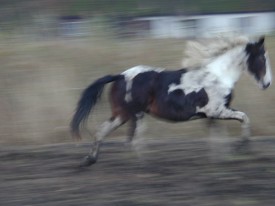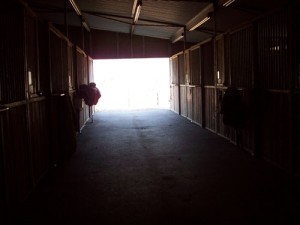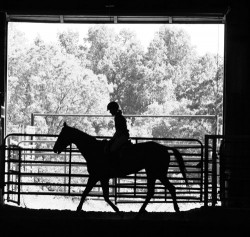By Brian Sutton
Marty’s daughter Joni sways back and forth, eyes closed, arms above her head, half-dancing in her seat in the car. She’s listening on her iPod to a song an older cousin used to play back in Kentucky, Ugly Kid Joe’s “I Hate Everything About You.”
Or at least Marty thinks that’s what she’s listening to. She has on earphones, so even though he’s sitting right next to her, he hears only a vague buzz. But Marty has come to recognize the song because Joni seems to listen to it constantly during those rare times when he’s allowed to be with her. Besides, she’s mouthing lyrics, and Marty thinks he hears a phrase or two from the song, half-whispered. Although he has to keep his eyes on the road, he’s also certain that once in awhile, after mouthing some of the words, she glances over at him and smirks.
Marty tries to concentrate on the weak, tinny signal from the oldies station on the car radio. A quavery voice from his youth—David Gates? Paul Davis?—is laboring through the chorus of a long-forgotten song about a rodeo rider: Ride ’em, cowboy, don’t let ’em throw you down / You can’t make no money if you hit the ground.
 Because he’s taking Joni to her riding lesson, Marty decides he can use the song to start a conversation, or at least to get her to acknowledge his existence.
Because he’s taking Joni to her riding lesson, Marty decides he can use the song to start a conversation, or at least to get her to acknowledge his existence.
“Listen to this, Joni,” he says.
She sways in her seat. He can’t tell whether she’s really listening or just pretending.
Marty nudges his daughter with his elbow. Joni flinches as if a stranger had touched her. Then she removes her earphones and stares at him.
“Hear that?” he asks.
“What?”
But the rodeo song has ended, and a commercial for insurance is on.
“There was a song on about riding horses,” he says. The words sound lame even to him.
She turns away and readjusts her earphones. Yet, a few minutes later, he senses that she’s looking at him and suppressing a bitter laugh. He leaves her alone, even though he suspects that she’s holding still, waiting for him to see her in this pose. But when he reaches a stop sign and turns toward her, she’s facing straight ahead, expressionless. She looks not as if she’s ignoring him, but as if there’s nobody there for her to ignore.
Joni never showed any interest in horses when they lived in Kentucky, where horses are a way of life. Marty suspects that at some level, her newfound hobby is one more way to remind him that she still considers Kentucky her home, hasn’t accepted living here.
Not that he is thrilled to be here, either: Every day, he checks the national weather report in the newspaper, splitting the difference between the predictions for Louisville and for Nashville to get an idea of what it’s like back home in Franklin. Today, for instance, it’ll be sunny, with a high near seventy, and he knows that the autumn leaves will be at peak, painting the hills in a riot of color. But here in northeast Wisconsin it’s below freezing, and snow is expected. Leafless trees dot the barren flatlands.
But he can’t say to Joni that, despite seeing little choice but to accept the promotion and the move that went along with it—to refuse a relocation would’ve meant he’d be stuck at assistant manager for the rest of his working life and would peak at fifty thousand a year tops—despite all this, he would’ve turned it down if only Joni and her mother had made clear just how strongly they opposed the move. If he’d known how they would wrap themselves in misery like a cloak and console themselves by reminding him, as often and as dramatically as possible, that he’s to blame, then things might be different now.
But he knows better than to bring it up, just as he knows better than to ask how Joni’s mother, his wife Penny, is getting along.
He turns into the lot at E-Z Acres, a mile or so beyond the city limits. Before Marty has even turned the car off, Joni has hopped out and is striding purposefully toward the stable. By the time Marty has retrieved his laptop computer and the folder bulging with financial reports from the backseat, she’s too far away to be reached.
As he watches her move away from him, Marty recalls how she had been until the past few months—not a brilliant or beautiful girl perhaps, but so sunny, so in control, with so much going for her. But now she seems alien, at war with life as she struggles to leave childhood behind and enter the strange land occupied by teens. It would be a difficult enough transformation for her even without the other changes in her life, and Marty is locked into new routines, unable to help her.
As he watches, Marty sees a patch of ice ahead of Joni. He almost calls out but knows he must choke back the urge. She crosses it without breaking stride.
Another girl about Joni’s age is leaving the stables as Joni is about to enter, and the two stop to talk for a few moments in passing. Hearing them laugh together, Marty allows himself to feel hope for the first time since he picked her up this morning, outside the house where he had lived from the time they moved to Green Bay until 24 days ago, when he either walked out on his wife or was thrown out of the house—he still isn’t quite sure which.
He watches the two girls so closely that he doesn’t notice when he reaches the patch of ice himself, and he almost slips and falls. Regaining his balance, he glances down at the hard, frozen ground, feels the gust of cold wind against his face, and clutches the laptop and the folder of paperwork tighter still.
At least the vestibule is warm. A few women sit on the bench, chatting or reading magazines as they wait for their daughters’ riding lessons to end. Another girl is talking to Eric, a teenaged stablehand. She makes a joke about hoofprint-shaped scars on Eric’s forehead and Eric laughs, but Marty feels uneasy: The boy strikes him as perhaps mentally retarded, doomed never to find a job above minimum wage or to attract a woman, and her laughter seems mocking. He’s relieved when a voice over the stable’s intercom system summons Eric away to the show ring.
Joni is at the far end of the vestibule, trying on riding helmets. Her earphones are off for the first time since the moment she got into the car. This is Marty’s first real chance to talk with her today—his first chance since last week.
“Who were you talking to outside?” he asks.
“Dunno,” Joni says, not looking up from the bin of helmets. “Just somebody who rides here.”
“Oh. The way you two were laughing, I thought you might be friends.” He waits, then ploughs ahead with “What were you two talking about?”
Still not looking at him, Joni pulls a riding helmet down past her ears. “She was just like, I must be sorry I’m not back in Kentucky on a day like this. I told her I was sorry, but not because of the weather.”
Marty edges closer. He tries again, asking, “So how’s school?”
“Okay.”
“Are you making any—”
“I said okay.”
By now, she has moved as far away from him as she can while staying within reach of the helmets. Marty notices some of the mothers sneaking glances at them over the tops of their newspapers.
“You don’t have to sweat about my making friends,” Joni adds, talking loudly enough for all to hear. “Making friends must be easy, you know? I mean we’d only lived here, like, a month before you started that thing you’ve got going with whatshername at the office.”
She looks at him, then at the mothers on the bench. She tugs her helmet to adjust the fit before heading toward the show ring for a lesson.
Marty wants to shout after her that what happened with Kim—the woman at the office—was just a symptom of his problems with Penny, not the cause of the problems. But he knows what an asshole that would make him sound like, not only to the listening mothers but to himself. Besides, at heart he knows that even if his marriage had been perfect, he never would’ve turned down the chance to acquire an attractive young lover, just as he knows at heart that he never would’ve turned down the promotion and the chance for more money, no matter the consequences for his family.
So now he must live with it: Not only can’t he be there to protect his daughter from life’s disasters, but he’s the cause of her current crop. And he can scarcely even talk to her—cannot tell her, for example, that all that remains of his thing with whatshername at the office is his fear of a possible sexual harassment complaint. Kim bailed the moment he transformed from a confident authority figure to a newly alone middle-aged man.
 Now Marty follows Joni to the show ring. To get there, he must walk down a narrow path with horse stalls on either side. Some of the horses peer out at him and make their peculiar chuffing sounds. Soft voices carry up from the stalls as the owners, girls about Joni’s age, soothe and curry the horses. He looks ahead for Joni and can’t find her. His stomach churns.
Now Marty follows Joni to the show ring. To get there, he must walk down a narrow path with horse stalls on either side. Some of the horses peer out at him and make their peculiar chuffing sounds. Soft voices carry up from the stalls as the owners, girls about Joni’s age, soothe and curry the horses. He looks ahead for Joni and can’t find her. His stomach churns.
Walking this path disturbs Marty, for reasons he has only recently understood. Just before the move from Kentucky, Joni went on what she called “the farewell tour,” staying overnight with one friend after another for a week. In her absence, he and Penny packed up every room. When Joni returned on the morning of the move, it was to rooms full of boxes stacked high above her head, with narrow paths between.
Marty still shudders remembering Joni’s unearthly wail as she ran into the room that was no longer her bedroom. He and Penny followed her in, but he couldn’t see her. Marty could only hear Joni’s sobs from somewhere among the boxes. Then Penny disappeared behind a wall of boxes, and for a few seconds he could see neither his wife nor his daughter. He heard them sobbing and calling for each other, over and over, searching, but not for him.
Although that moment had been terrible, Marty had thought he’d left it behind. But in the weeks that he has been living alone—first in a hotel room and now in an apartment he’s furnished with a television, a mattress, an alarm clock, and nothing else—he dreams he is searching for Penny and Joni in a huge circular maze, like the gardens at British estates, but in place of the hedges are his moving boxes. Joni’s sobbing in the dream gets louder and louder, and he can’t find her no matter how hard he searches. He looks and looks as her crying fades away, until, somewhere in the middle of the circle, he’s lost her completely.
Now, Marty reaches the show ring, where the lesson has already begun. Joni is riding an old, docile horse named Sugar. They move in easy circles around the ring while the teacher, Lorraine, watches. “Heels down!” Lorraine calls out, then a few seconds later adds, “Okay, reverse directions and take her into a trot.”
Shivering, Marty watches, waving whenever Joni and Sugar pass. She never looks at him. But when he finally turns away and begins trudging back toward the heated vestibule to work, he hears a singsong voice cry out, “Bye! Sorry you don’t care enough to stay and watch!” He turns, but by now he’s too far up the path to see her. He resumes his slow walk away.
Marty cannot understand why the move has been so traumatic. He had moved with his parents several times while growing up, and it wasn’t so hard. You open a gate and go through, leave something behind, find something else instead. What’s the big deal?
At the vestibule, Marty finds to his relief that the mothers have left. Sitting at the end of the bench near the heating duct, he boots up his laptop and begins poring over quarterly reports.
But he can’t concentrate. His head hurts, probably because he stayed up too late last night, sitting on his mattress drinking and channel surfing as best he could without cable. He had finally settled on what he recognized as the original of some movie that had just been remade. In the version he saw on TV, members of Hollywood’s old rat pack played con men who planned to fulfill their dreams of women and wealth by robbing a bunch of different Las Vegas casinos all in one night, intermittently breaking into song.
He watched until Dean Martin appeared at a piano, surrounded by showgirls, crooning, “Ain’t love a kick in the head?” Disgusted, Marty clicked the TV off. His apartment fell silent. Then he heard a rumbling beneath him, a steady bass—rock music from the apartment below.
He hears Lorraine’s voice over the vestibule’s intercom. “Eric, I told you to have Moira ready at two thirty, not one thirty!” she shouts. “I’m in the middle of a lesson now.”
“Shit,” the stable boy mutters.“Sorry, Lorraine. Should I take him back to his stall?”
“No. She’s all worked up now. We’ll have to let her run it off in the show ring—which means interrupting the lesson. This crap has got to stop, Eric, or you’ll be outta here on your butt.”
Marty returns the paperwork to the folder, switches off the laptop, and heads back to the show ring to see what the problem is.
When he arrives, the gate dividing the show ring from the path is closed. But above the top of the gate, he can see a huge black mare galloping around the ring, a man on its back. The man is a skillful rider but is struggling to control the horse. Joni is standing just outside the show ring, Sugar by her side.
“New horse we just got,” explains Lorraine, in the voice she uses for clients. “Lots of potential, but too wild right now. We’ve been trying to do her training sessions between lessons, but she got saddled up and brought down by mistake now, and that’s got her all excited. We need to let her blow off some steam before we take her back to the stall. Sorry for the interruption. We can extend your daughter’s lesson if you like.”
“Thanks,” Marty says, pleased to be consulted about something involving Joni. He’s also cautiously optimistic because, although Joni hasn’t spoken, he no longer senses animosity radiating from her. It’s as if she, like the big mare, had needed a few trips around the show ring to calm down.
“How’s she doing?” he asks, nodding toward Joni.
“Very well,” Lorraine replies. “In fact, so well that she can move up to another horse. Sugar, here, is nice for beginners—real slow, calm. But I think Joni’s ready for one that can do more, one with a little more spirit.”
Marty looks out at the show ring, where the black horse seems to be battling the will of its rider. “Not like—” he begins.
“No, nothing like Moira out there,” Lorraine says, laughing. “Just a little livelier than Sugar. There are two different horses we usually have riders try after Sugar, and I’ll let her choose between them. I already told the boys to bring them down.”
A few seconds later, Eric and another stable hand arrive, leading a pair of horses, one dappled and one bay. To Marty’s relief, they seem just as calm as Sugar.
“Take your pick, Joni,” Lorraine says.
“I dunno,” Joni says, looking at them. Then she turns to Marty and asks, “What do you think, Dad?”
Marty feels a surge of elation. Maybe his daughter has declared a truce. He knows nothing about horses, yet it somehow seems important for him to state a preference.
As he stares at the horses, the dappled one closes one eye and then reopens it and tosses its head. A wink and a nod—perhaps it’s an omen? “I like that one,” he says, pointing.
 “Okay, let’s saddle him up,” Joni says. Eric and Joni transfer the saddle from Sugar to the dappled horse, and the other stable hand leads Sugar and the bay horse back to the stalls.
“Okay, let’s saddle him up,” Joni says. Eric and Joni transfer the saddle from Sugar to the dappled horse, and the other stable hand leads Sugar and the bay horse back to the stalls.
Joni mounts the dappled horse and pets its mane. “I’ll call him Daddy’s Choice,” she says, smiling at Marty for the first time today. “D.C. for short.”
“That’s not his name,” Lorraine says. “Actually, he’s called—”
“No, don’t tell me,” Joni replies. “I like the name I gave him.”
Marty looks at his daughter, searching for signs that he’s being mocked. But she sits quietly in the saddle, her expression giving away nothing.
Lorraine calls to Eric, “Unlatch the gate. Let’s get Moira out of there and get on with the lesson.” Eric unlatches the hook and slides the gate open.
Marty glances at the black horse, which is now winded and breathing furiously. Then he looks at Joni’s new horse, trying to find signs of the livelier temperament Lorraine had mentioned. But like Joni, the horse is still, giving away nothing.
As the black horse approaches, Marty notices that the gate isn’t open all the way. He considers telling Eric to give it another tug but pauses, remembering that the boy has already had his shortcomings pointed out more than once today. Then it’s too late to correct it, for Moira, whinnying and tossing her head, is already striding through the narrow opening. At the same time, Joni has shaken the reins and tapped the sides of her horse with her spurs, easing it toward the ring. “C’mon, D.C.,” she says softly.
With Moira only a few feet away, Marty flattens against the wall. The big mare gives no sign of causing trouble, but Marty worries its belligerence might somehow infect the horse Joni is riding as the two pass one another. He is relieved when Joni’s horse swerves toward the edge of the chute, away from the mare.
But something looks odd. Joni’s horse seems to have stopped near the gate, just inside the ring. Yet its legs haven’t stopped at all—in fact, the horse seems to be walking in place, straining to move forward. Joni looks perplexed. She flicks the horse with her riding crop.
Then Marty sees the problem. The gate latch has caught in Joni’s stirrup just below her heel. No matter how hard the horse pulls, the latch, now extended full length from its attachment to the gate, holds it back. But neither Joni nor Lorraine sees this.
Marty leaps forward, shouting, “Hey! Wait!” But Joni calls, “Come on, D.C.!” and spurs the horse. Alarmed, the horse tugs harder, putting more pressure on the hook until the gate bursts off its hinges and hits the horse. Panicked, the horse shoots forward like a bronco exploding from a rodeo stall.
His view partly blocked, Marty sees only the top of the horse bobbing up and down, Joni’s torso a blur above it. Then Joni drops from sight and Marty hears a thud.
“My God!” he shouts, running to the edge of the ring, where the gate had been.
Joni lies crumpled, face down, near the center of the ring, recognizable only by her Franklin Central jacket. At the far end of the ring the horse is bucking frantically, the latch still caught in its stirrup, dragging the gate. The horse turns toward the spot where Joni lies.
Joni is motionless, perhaps unconscious. Yet, just like in the car, Marty senses she’s watching him, waiting to see what he’ll do now.
The horse appears to be galloping straight toward Joni.
Marty sprints, throwing aside all the baggage he’s been carrying. He leaps toward his daughter, stretching out his arms so he can cover Joni before the horse gets to her.
But to his surprise, Joni springs to life. She rolls out of the path of danger and pushes herself upright all in one swift motion. Marty loses sight of her as he crashes to the ground. He is blinded by the dirt. Muck clogs his ears. All he can hear is a rumble, far off, growing louder, like a bass beat rising through the floor. He listens hard for anything else—a woman’s voice calling out, the voice of a girl searching for him, someone wanting to be found. The rumbling rises like thunder, and Marty cries out, hoping to hear any voice besides his own.
Art Information
- “Galloping Horse”; stock image
- Untitled image of stable © Jade Krafsig; stock image
- Untitled image of horse and rider © Mary R. Vogt; stock image
 Brian Sutton directs the English Composition Program and the Writing Center at the University of Wisconsin-Green Bay.
Brian Sutton directs the English Composition Program and the Writing Center at the University of Wisconsin-Green Bay.
His short stories have appeared in Apalachee Review, The Journal, and Phoenix, among other places, and his creative nonfiction has appeared in Writing on the Edge. His play Running Mates received a staged reading at the University of Wisconsin-Green Bay in 2010, and his musical Searching for Romeo is scheduled for a full production on the same campus in the summer of 2012.
He has won three Hopwood Awards, two for collections of short stories and one for a collection of one-act plays.
